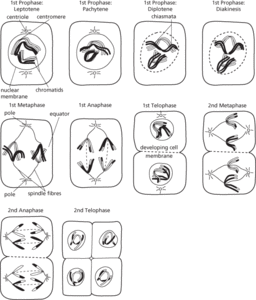A type of nuclear division that gives rise to four reproductive cells (gametes) each with half the chromosome number of the parent cell. Two consecutive divisions occur. In the first, homologous chromosomes become paired and may exchange genetic material (see crossing over) before moving away from each other into separate daughter nuclei. This is the actual reduction division because each of the two nuclei so formed contains only half of the original chromosomes. The daughter nuclei then divide by mitosis and four haploid cells are produced. See also prophase; metaphase; anaphase; telophase.

The stages of meiosis in a cell containing two pairs of homologous chromosomes
The process of division of sex cells, resulting in the formation of gametes (eggs or sperm cells). In meiosis the nucleus undergoes two separate divisions, but the chromosomes are duplicated only once. So the four daughter cells each possess only half the chromosomes of the parent cell. When the egg and sperm, each with half a complement of chromosomes, unite, the two halves join together, resulting in a fertilized egg with the full number of chromosomes. This is a principal source of the difference between offspring and parents. During meiosis the original chromosomes may break and rejoin with others lying alongside them; this process (crossing over) is also a source of genetic variation. In philosophical discussion of abortion, it is sometimes suggested that it is only after the joining up process that we have a single entity with the potential for life, and that this separates the morality of abortion from that of birth control.
- Bubble Nebula
- bubble plot
- bubble point
- bubble pulse
- bubble sort
- bubble sort algorithm
- bubbling zone
- bubbly flow
- Buber, Martin (1878–1965)
- bubnoff unit
- bubonic plague
- buccal cavity
- buccaneer
- Buchanan, James (1791–1868)
- Buchan metamorphic zones
- Buchan spells
- Buchli, James Frederick (1945– )
- Buchmanism
- Buchner, Eduard
- Buchner funnel
- Buchner, Hans Ernst Angass
- bucket
- bucket-brigade device
- bucket sort
- Buckingham, George Villiers, 1st Duke of (1592–1628)